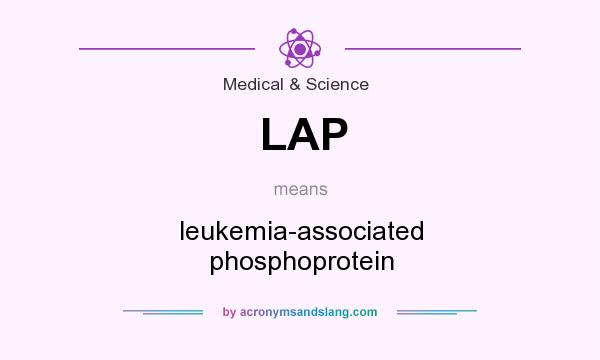What does LAP mean?
LAP means leukemia-associated phosphoprotein
This acronym/slang usually belongs to Medical & Science category.
What is the abbreviation for leukemia-associated phosphoprotein?
leukemia-associated phosphoprotein can be abbreviated as LAP

|
|
Most popular questions people look for before coming to this page
| Q: A: |
What does LAP stand for? LAP stands for "leukemia-associated phosphoprotein". |
| Q: A: |
How to abbreviate "leukemia-associated phosphoprotein"? "leukemia-associated phosphoprotein" can be abbreviated as LAP. |
| Q: A: |
What is the meaning of LAP abbreviation? The meaning of LAP abbreviation is "leukemia-associated phosphoprotein". |
| Q: A: |
What is LAP abbreviation? One of the definitions of LAP is "leukemia-associated phosphoprotein". |
| Q: A: |
What does LAP mean? LAP as abbreviation means "leukemia-associated phosphoprotein". |
| Q: A: |
What is shorthand of leukemia-associated phosphoprotein? The most common shorthand of "leukemia-associated phosphoprotein" is LAP. |
Abbreviations or Slang with similar meaning
- CLL-M - Chronic Lymphocytic Leukemia Associated Macroglobulinemia
- SKAP55 - Src Kinase-Associated Phosphoprotein of 55 Kilodaltons
- ATLMA - Adult T-Cell Leukemia-Associated Membrane Antigen
- LAP - Leukemia Associated Protein
- LPAP - Lymphocyte Phosphatase Associated Phosphoprotein
- ATLA - adult T-cell leukemia associated antigen
- ATLA - anti-adult T-cell leukemia-associated antigens
- CALLA - Common Acute Lymphocytic Leukemia Associated
- LAA - leukemia-associated antigen
- LAP - leukemia-associated phenotype
- LAI - leukemia associated inhibitor
- LIA - leukemia-associated inhibitory activity
- GAP-43 - growth-associated phosphoprotein-43
- GAP43 - growth-associated phosphoprotein 43
- Laas - Leukemia-Associated Antigens
- Larg - Leukemia-Associated Rho Guanine Nucleotide Exchange Factor
- Larg - Leukemia-Associated Rhogef
- Skap55 - Src Kinase-Associated Phosphoprotein of 55 Kda
- larg - Leukemia Associated Rho Guanine
- LPAP - Lymphocyte Phosphatase-Associated Phosphoprotein